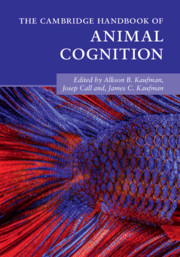Book contents
- The Cambridge Handbook of Animal Cognition
- The Cambridge Handbook of Animal Cognition
- Copyright page
- Dedication
- Contents
- Figures, Tables, and Boxes
- Contributors
- Acknowledgments
- Introduction
- Part I Communication and Language
- Part II Memory and Recall
- Part III Social Cognition
- Part IV Social Learning and Teaching
- Part V Numerical and Quantitative Abilities
- Part VI Innovation and Problem-Solving
- 28 Innovation and Problem-Solving Overview
- 29 General Intelligence (g) in Mice
- 30 Bowerbird Innovation and Problem-Solving
- 31 Parrot Innovation
- 32 Innovation in Marine Mammals
- 33 Innovation in Capuchin Monkeys
- 34 Innovation and Problem-Solving in Orangutans
- 35 Do Apes and Monkeys Know What They (Don’t) Know?
- 36 Decision Making in Animals
- Index
- References
29 - General Intelligence (g) in Mice
from Part VI - Innovation and Problem-Solving
Published online by Cambridge University Press: 01 July 2021
- The Cambridge Handbook of Animal Cognition
- The Cambridge Handbook of Animal Cognition
- Copyright page
- Dedication
- Contents
- Figures, Tables, and Boxes
- Contributors
- Acknowledgments
- Introduction
- Part I Communication and Language
- Part II Memory and Recall
- Part III Social Cognition
- Part IV Social Learning and Teaching
- Part V Numerical and Quantitative Abilities
- Part VI Innovation and Problem-Solving
- 28 Innovation and Problem-Solving Overview
- 29 General Intelligence (g) in Mice
- 30 Bowerbird Innovation and Problem-Solving
- 31 Parrot Innovation
- 32 Innovation in Marine Mammals
- 33 Innovation in Capuchin Monkeys
- 34 Innovation and Problem-Solving in Orangutans
- 35 Do Apes and Monkeys Know What They (Don’t) Know?
- 36 Decision Making in Animals
- Index
- References
Summary
The history of attempts to identify a correlational structure across a battery of cognitive tasks in nonhumans is reviewed, specifically with respect to mice. The literature on human cognition has long included the idea that subjects retain something of their rank-ordering across a battery of cognitive tasks, yielding what is characterized as a positive manifold of cross-task correlations. This manifold is often referred to as marking a general intelligence factor (g). The literature on individual differences in nonhumans has until recently evidenced a different conclusion, one that emphasized the evolution of niche-specific adaptive specializations rather than the evolution of general cognitive mechanisms. That conclusion in the nonhuman literature has now been successfully challenged. There is little doubt that nonhuman subjects also reveal a positive manifold that is of a similar magnitudecompared to the human data. Problems remain in deciding whether this nonhuman g is the same g as is found using human subjects. The available data are promising but not decisive in suggesting that the two constructs are marking similar processes.
- Type
- Chapter
- Information
- The Cambridge Handbook of Animal Cognition , pp. 653 - 666Publisher: Cambridge University PressPrint publication year: 2021

